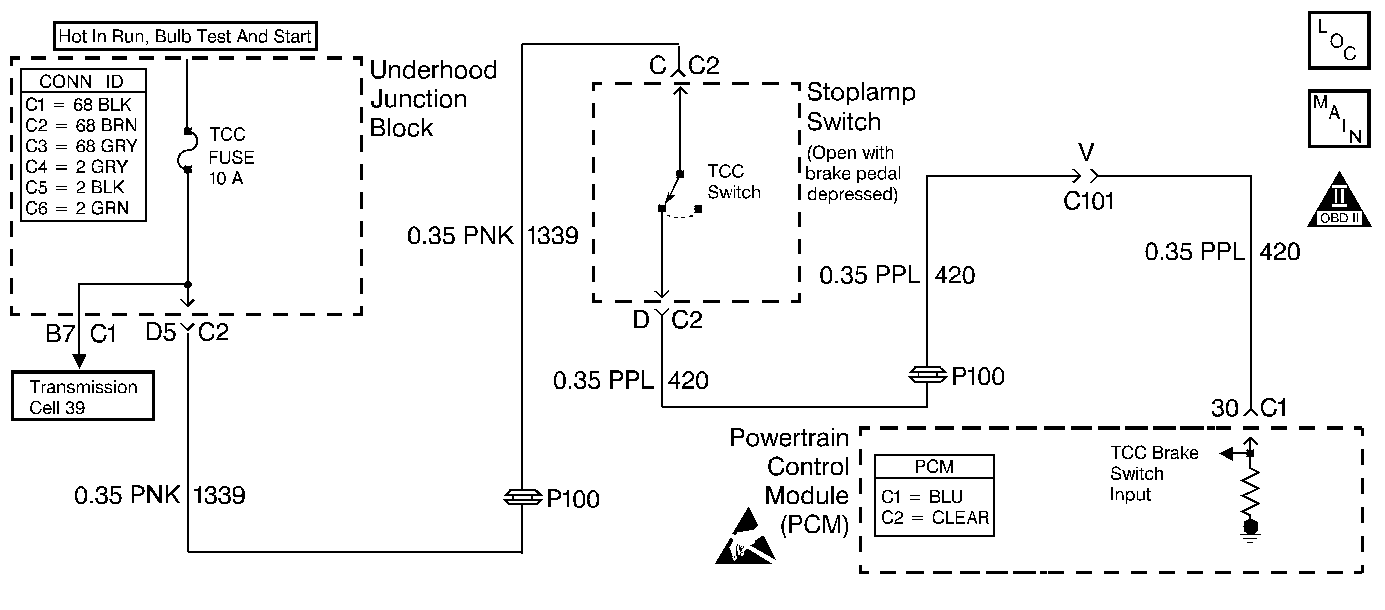
Circuit Description
The TCC brake switch reports brake pedal status to the PCM. The TCC brake switch indicates that the brake pedal is either applied or released. The normally-closed switch supplies battery voltage to the PCM. Applying the brake pedal opens the TCC brake switch, interrupting voltage to the PCM. When the PCM receives 0 volts at the TCC brake switch input, the PCM turns OFF the torque converter clutch pulse width modulation (TCC PWM) solenoid valve.
If the PCM detects an open brake switch (indicating pedal applied) during acceleration, then DTC P0719 sets. DTC P0719 is a type D DTC.
Conditions for Running the DTC
No VSS DTCs P0502 or P0503.
Conditions for Setting the DTC
The TCC brake switch indicates continuously OPEN (0 volts) for more than 15 minutes and the following conditions occur 7 times consecutively.
| • | The vehicle speed is less than 8 km/h (5 mph); |
| • | Then the vehicle speed is between 8 km/h (5 mph) and 32 km/h (20 mph) for at least 4 seconds; |
| • | Finally, the vehicle speed remains above 32 km/h (20 mph) for 6 seconds. |
Action Taken When the DTC Sets
| • | The PCM does not illuminate the malfunction indicator lamp (MIL). |
| • | The PCM disregards the TCC brake switch for TCC scheduling when all of the following conditions are met: |
| - | The TP angle is greater than 6%. |
| - | The vehicle speed is greater than 60 km/h (37 mph). |
| - | The TP angle was previously greater than 12% while the vehicle speed was greater than 68 km/h (42 mph). |
| - | The TCC brake switch has not indicated OFF for more than 2 seconds this trip. |
Conditions for Clearing the DTC
| • | A scan tool clears the DTC from PCM history. |
| • | The PCM clears the DTC from PCM history if the vehicle completes 40 consecutive warm-up cycles without a non-emission-related diagnostic fault occurring. |
| • | The PCM cancels the DTC default actions when the fault no longer exists and the ignition switch is OFF long enough in order to power down the PCM. |
Diagnostic Aids
| • | Inspect the wiring at the PCM, the TCC brake switch connector and all other circuit connecting points for the following conditions: |
| - | A backed out terminal |
| - | A damaged terminal |
| - | Reduced terminal tension |
| - | A chafed wire |
| - | A broken wire inside the insulation |
| - | Moisture intrusion |
| - | Corrosion |
| • | When diagnosing for an intermittent short or open, massage the wiring harness while watching the test equipment for a change. |
Test Description
The numbers below refer to the step numbers on the diagnostic table.
Step | Action | Value(s) | Yes | No | ||||||
|---|---|---|---|---|---|---|---|---|---|---|
1 | Was the Powertrain On-Board Diagnostic (OBD) System Check performed? | -- | Go to Powertrain On Board Diagnostic (OBD) System Check in Engine Controls | |||||||
2 |
Important: Before clearing the DTCs, use the scan tool in order to record the Failure Records for reference. Using the Clear Info function will erase the stored Failure Records from the PCM. Did you record the Failure Records? | -- | -- | |||||||
3 |
Important: The condition that affects this circuit may exist in other connecting branches of the circuit. Refer to Power Distribution Schematics in Wiring Systems for complete circuit distribution.
Refer to General Electrical Diagnosis in Wiring Systems. Was a condition found and corrected? | -- | ||||||||
4 |
Refer to General Electrical Diagnosis in Wiring Systems. Was a condition found? | -- | ||||||||
5 |
Important: The condition that affects this circuit may exist in other connecting branches of the circuit. Refer to Power Distribution Schematics in Wiring Systems for complete circuit distribution. Inspect circuit 1339 (PNK) of the engine wiring harness for a short to ground. Refer to General Electrical Diagnosis in Wiring Systems. Was a condition found? | -- | -- | |||||||
Does the TCC brake switch status change from Open to Closed? | -- | |||||||||
7 |
Refer to General Electrical Diagnosis in Wiring Systems. Was a condition found? | -- | ||||||||
8 |
Refer to Wiring Repairs in Wiring Systems. Is the repair complete? | -- | -- | |||||||
9 | Replace the TCC brake switch. Refer to Stop Lamp Switch Replacement in Hydraulic Brakes. Is the repair complete? | -- | -- | |||||||
10 |
Refer to Powertrain Control Module Replacement/Programming in Engine Controls. Is the repair complete? | -- | -- | |||||||
11 | Perform the following procedure in order to verify the repair:
Has the test run and passed? | -- | System OK |
